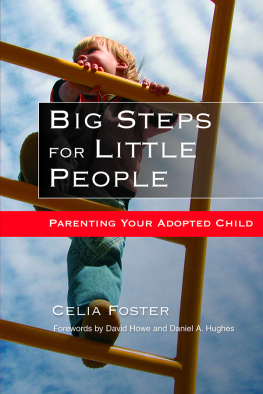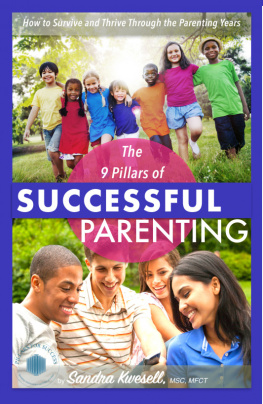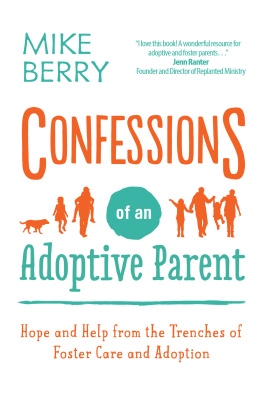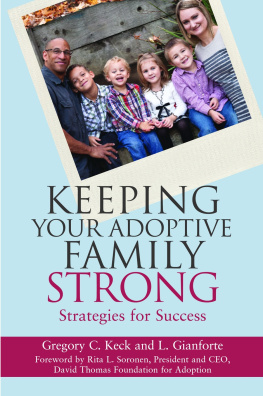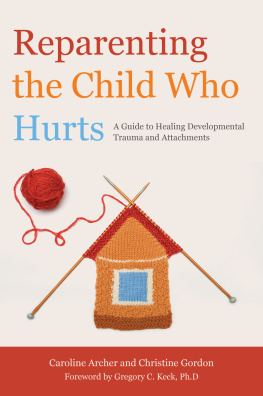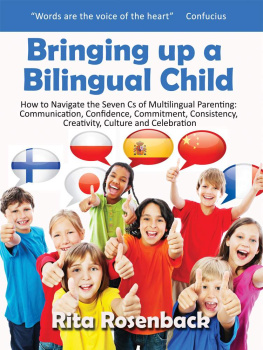Gregory Keck - Parenting the Hurt Child: Helping Adoptive Families Heal and Grow
Here you can read online Gregory Keck - Parenting the Hurt Child: Helping Adoptive Families Heal and Grow full text of the book (entire story) in english for free. Download pdf and epub, get meaning, cover and reviews about this ebook. year: 2014, publisher: The Navigators, genre: Children. Description of the work, (preface) as well as reviews are available. Best literature library LitArk.com created for fans of good reading and offers a wide selection of genres:
Romance novel
Science fiction
Adventure
Detective
Science
History
Home and family
Prose
Art
Politics
Computer
Non-fiction
Religion
Business
Children
Humor
Choose a favorite category and find really read worthwhile books. Enjoy immersion in the world of imagination, feel the emotions of the characters or learn something new for yourself, make an fascinating discovery.

- Book:Parenting the Hurt Child: Helping Adoptive Families Heal and Grow
- Author:
- Publisher:The Navigators
- Genre:
- Year:2014
- Rating:5 / 5
- Favourites:Add to favourites
- Your mark:
- 100
- 1
- 2
- 3
- 4
- 5
Parenting the Hurt Child: Helping Adoptive Families Heal and Grow: summary, description and annotation
We offer to read an annotation, description, summary or preface (depends on what the author of the book "Parenting the Hurt Child: Helping Adoptive Families Heal and Grow" wrote himself). If you haven't found the necessary information about the book — write in the comments, we will try to find it.
Gregory Keck: author's other books
Who wrote Parenting the Hurt Child: Helping Adoptive Families Heal and Grow? Find out the surname, the name of the author of the book and a list of all author's works by series.
Parenting the Hurt Child: Helping Adoptive Families Heal and Grow — read online for free the complete book (whole text) full work
Below is the text of the book, divided by pages. System saving the place of the last page read, allows you to conveniently read the book "Parenting the Hurt Child: Helping Adoptive Families Heal and Grow" online for free, without having to search again every time where you left off. Put a bookmark, and you can go to the page where you finished reading at any time.
Font size:
Interval:
Bookmark:
When thinking of all of the people who have been involved in helping us help families with hurt children, it becomes difficultactually impossibleto identify them individually. In fact, it is the integration of a host of factors, experiences, children, adolescents, parents, and professionals that has made this book possible.
There were times when we wondered out loud if we were addressing important issues. Were we providing the tools parents need to undertake the huge task of helping children heal from the traumas thrust upon them early in life? While we were sometimes able to answer our own queries, most of the time the answers came from others. To all of the people who shared their observations, a heartfelt thanks.
L. G. Mansfield, our friend and editor, has helped make this book talk to the reader in the same voice as Adopting the Hurt Child. Thanks, Elle.
We are grateful to Carol Blatnicky for her chapter The School Dance. Families struggle so much with the situations she addresses. We are certain you will find her information helpful. Thanks, Carol.
Special thanks to all of the parents and children who shared their thoughts in . We learn so much from the families with whom we work.
It is a privilege to include Launas beautiful poem in our book, and we thank her.
Ohio is a special state for adoptive families. For years, there have been monies made available through the Post-Adoptive Special Services Subsidy (PASSS) program. We know of no other place in the world that has such a post-adoptive program. Thank you, Ohio, and your eighty-eight counties.
We thank NavPress for receptivity to our thoughts and ideas, valuable ongoing input, and a simple and productive publishing process. A special thanks to Kris Wallen, who first encouraged us to think about doing updates on both of our books.
Additional thanks to all the people at the Attachment and Bonding Center of Ohio, who keep the day-to-day operations running smoothly as they encounter extremely difficult work.
To Ann Winchester, who has been Reginas friend since they were toddlers, thank you for getting us out of all our computer glitches. Youre right; it was easier than the way we did the first bookon legal pads!
Thank you to ATTACh, Jewel Among Jewels, North American Council on Adoptable Children (NACAC), and Adoptive Families magazine for publishing our articles and allowing them to be reprinted in Authors Smorgasbord. We would also like to give special thanks to Patty Hamblin, LSW, post-adoption social worker, and the Wayne County Children Services Board for allowing us to reprint questions and answers from their publication The Connection in our chapter Ask an Expert.
And, just as we did in Adopting the Hurt Child, we thank our parents and grandparents for providing the kind of foundation that has allowed us to deeply understand the critical nature of family.
From Greg:
I often ask my son James for his thoughts and opinions. He, as most adolescents, usually has an answer that shows great insight and simplicity. Once, as I was getting ready to participate in a meeting to decide whether or not a sibling group should stay together, I asked James what he thought. His answer was direct and to the point, If they can get along with each other, they should stay together. Made sense to me! I think of his answer each time I am asked to address this issue. Thank you, James. And to both of my sons, Brian and James, who keep providing me with new ideas and opportunities to be creativethanks, guys!
From Regina:
To my husband, who has been patient and supportive during busy times. Thank you, Don.
We hope this sequel to Adopting the Hurt Child will give you, the reader, information and perspective that will strengthen your commitment to your hurt child. Most important, we hope it will provide you with renewed hope for that childs healing and growth.
GREGORY C. KECK, PhD, founded the Attachment and Bonding Center of Ohio, which specializes in the treatment of children and adolescents who have experienced developmental interruptions. In addition, he and his staff treat individuals and families who are faced with a variety of problems in the areas of adoption, attachment, substance abuse, sexual abuse, and adolescent difficulties.
Dr. Keck is certified as a diplomate and fellow by the American Board of Medical Psychotherapy, and is a diplomate in professional psychotherapy. He is a part-time graduate faculty member in the School of Social Work at the University of Akron and is involved in training for a diversity of agencies, hospitals, and organizations both nationally and internationally.
His memberships include the Cleveland Psychological Association, the Ohio Psychological Association, the American Psychological Association, and the National Association of Social Workers. From 1991 through 2000, he served on the board of directors of ATTACh, the Association for treatment and training in the Attachment of Children. He served as president for two years, and was honored by the organization in 2001 with its annual award for outstanding contribution to the field.
Dr. Keck was given the Adoption triad Advocate Award in 1993 by the Adoption network of Cleveland, Ohio.
He is an adoptive parent, and has appeared on numerous television and radio talk shows to discuss a broad spectrum of adoption issues.

REGINA M. KUPECKY, LSW, has worked in the adoption arena for more than thirty years as an adoption placement worker and therapist. Her services to children have been recognized by the Ohio Department of Human Services, which named her Adoption Worker of the Year in 1990.
She is currently a therapist with Dr. Keck at the Attachment and Bonding Center of Ohio, where she works with children who have attachment disorders. She trains nationally and internationally on adoption issues, sibling issues, and attachment.
Ms. Kupecky authored a resource guide, Siblings are Family, Too, which is available through the Three Rivers Adoption Council in Pittsburgh, Pennsylvania. She has coauthored a curriculum with Dr. Keck and Arleta James called Abroad and Back: Parenting and international Adoption, and has written a curriculum on sibling issues entitled My Brother, My Sister: Sibling Relations in Adoption and Foster Care.
She coauthored a chapter in the book Clinical and Practice Issues in AdoptionRevised and Updated: Bridging the Gap between Adoptees Placed as Infants and as Older Children, and has also written several newsletter articles for organizations including Jewel Among Jewels, ATTACh, and NACAC.
MS. Kupecky received a Master of Arts in teaching (MAT) from John Carroll University.
ONE
Understanding the Attachment Cycle
For those who have read Adopting the Hurt Child or have a good understanding of attachment issues, this chaptercondensed, with permission, from our first bookwill serve as a review. For those new to the topic, this will provide an introduction to the hurt child.
There is a common childrens verse that says, Sticks and stones may break my bones, but words will never hurt me. For the abused child, nothing could be further from the truth. While the effects of physical abuse usually heal over time, the psychological insults experienced by the child bring deep, long-lasting pain. These wounds fester within, creating ongoing difficulties for both the child and the adoptive family.
Many adoptive children did not experience early childhood trauma, neglect, or abuse. In these cases, the issues they face are common to all children and are supplemented by issues related directly to adoption. But for adoptive youngsters who lived through a difficult start, there is a range of developmental complications tied to the abuse, trauma, or neglect.
Font size:
Interval:
Bookmark:
Similar books «Parenting the Hurt Child: Helping Adoptive Families Heal and Grow»
Look at similar books to Parenting the Hurt Child: Helping Adoptive Families Heal and Grow. We have selected literature similar in name and meaning in the hope of providing readers with more options to find new, interesting, not yet read works.
Discussion, reviews of the book Parenting the Hurt Child: Helping Adoptive Families Heal and Grow and just readers' own opinions. Leave your comments, write what you think about the work, its meaning or the main characters. Specify what exactly you liked and what you didn't like, and why you think so.

